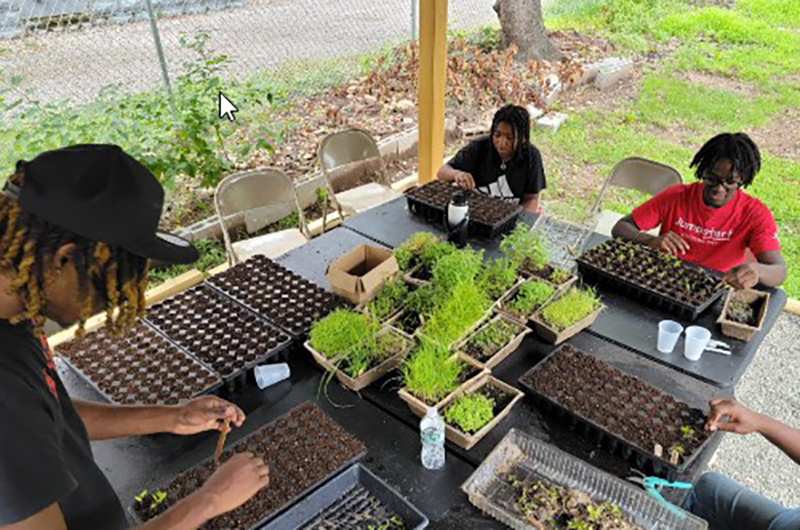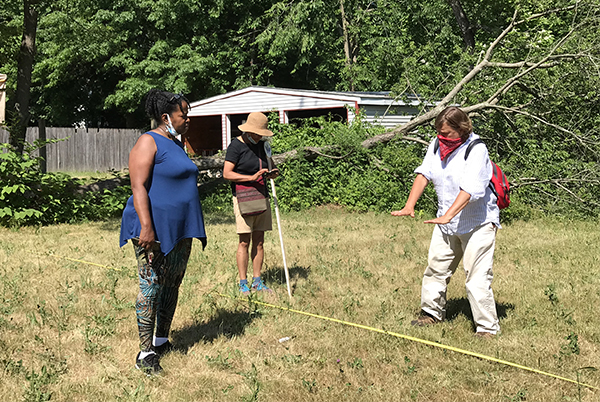When Doreen Abubakar brought the Pollinator Pathway initiative to New Haven seven years ago, she wanted to install native plant gardens in underserved neighborhoods to help bees and bring wildlife to communities. The vice president of the Elm City Parks Conservancy was one of the first community leaders to join what has become an international effort to plant native gardens to help pollinators along the Pollinator Pathway.

Photo Credit: Community Placemaking Engagement Network (CPEN)
Founder and executive director of the Community Placemaking Engagement Network, (CPEN,) the long-time New Haven leader faced multiple challenges. “Native plants are expensive. How are we going to get them into our inner cities? How are we going to create connectivity to nature in underserved urban communities?” she wondered.
That year, she gained access to a vacant city-owned lot along the Farmington Heritage Trail called the Mudhole, which was known as a place for drug dealing and violence. She engaged the help of Pollinator Pathway leader Louise Washer and volunteers from the Darien and Norwalk Pollinator Pathways. She hired local teenagers to help build raised garden beds. CPEN also hosted a workshop about how to grow native plants for pollinators in a milk jug.

To solve the problem of providing native plants to low-income residents, Abubakar recently launched the Bird-Friendly New Haven program, partnering with Highstead to learn how to harvest seeds and grow plants from those seeds. Highstead Executive Director Geordie Elkins showed her and about 10 teenagers how to collect seeds in the fall from Highstead’s meadow and propagate them. They planted them in seed trays to be hardened off in the winter and replanted the plugs in larger pots. With the help of a grant, the teenagers earned $15 an hour.
“When you work in an underserved neighborhood, you need to be able to pay minimum wage,” she says. The teens learned a skill and attained gardening knowledge, got paid, and gained confidence in their abilities. “I raised three boys myself. Lots of negative things get said about African American young men,” she says. With all the options these teens face, she says, she’s glad they’re able to learn and observe how plants grow and evolve. A generous donor paid for the teens to visit the New York Botanical Garden, providing them with another learning experience.
Mirroring the Pollinator Pathway initiative’s partnership concept, CPEN’s Bird-Friendly New Haven program is partnering with Audubon Connecticut, New Haven’s Pollinator Pathway, and the New Haven Neighborhood Housing Services, as well as Highstead. High school students spent five months planting, watering, and nurturing the plants. This spring and summer, teenagers will plant small native plant gardens at people’s homes in Newhallville and three other underserved neighborhoods. Abubakar is coordinating with other environmental groups, the New Haven Neighborhood Housing Services, and city officials to eventually plant natives citywide.
“Being able to propagate the seeds has made all the difference,” she says. “We’ve been able to bring butterflies and nature to the neighborhood.”
The teens are also learning to build planters out of recycled wood that they plan to sell to raise money for the program. Bird-Friendly New Haven is partnering with Sherwin Williams to buy stain at a discount, she says.

When rain gardens were installed in New Haven neighborhoods to address water runoff, one of the first gardens was installed in her Newhallville neighborhood, she says. For the first time, she saw butterflies and birds she hadn’t seen before.
“It only happened because the plants were there. Imagine a kid riding his bike and he sees butterflies or a cluster of birds in the shrubs. It would brighten anybody’s day,” she says. Once she understood what that exposure to nature did for her, she wanted others to have the same experience. “There’s something to capture your attention when you’re down and out. These are things that everybody should be able to enjoy. We’re building a connection to nature.”